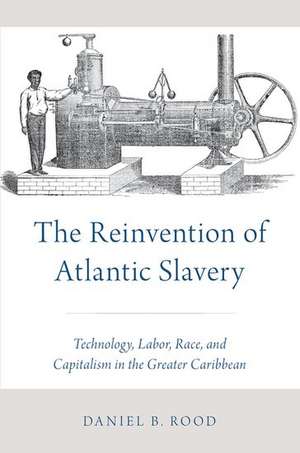The Reinvention of Atlantic Slavery: Technology, Labor, Race, and Capitalism in the Greater Caribbean
Autor Daniel B. Rooden Limba Engleză Paperback – 22 iun 2020
| Toate formatele și edițiile | Preț | Express |
|---|---|---|
| Paperback (1) | 177.25 lei 31-38 zile | |
| Oxford University Press – 22 iun 2020 | 177.25 lei 31-38 zile | |
| Hardback (1) | 586.75 lei 31-38 zile | |
| Oxford University Press – 7 iun 2017 | 586.75 lei 31-38 zile |
Preț: 177.25 lei
Preț vechi: 200.62 lei
-12% Nou
Puncte Express: 266
Preț estimativ în valută:
33.92€ • 36.27$ • 28.28£
33.92€ • 36.27$ • 28.28£
Carte tipărită la comandă
Livrare economică 07-14 aprilie
Preluare comenzi: 021 569.72.76
Specificații
ISBN-13: 9780197528426
ISBN-10: 0197528422
Pagini: 290
Ilustrații: 33 hts
Dimensiuni: 155 x 231 x 20 mm
Greutate: 0.43 kg
Editura: Oxford University Press
Colecția OUP USA
Locul publicării:New York, United States
ISBN-10: 0197528422
Pagini: 290
Ilustrații: 33 hts
Dimensiuni: 155 x 231 x 20 mm
Greutate: 0.43 kg
Editura: Oxford University Press
Colecția OUP USA
Locul publicării:New York, United States
Recenzii
Cleverly conceptualized.
Rood's work reorients scholarly perspectives on the transformation of Atlantic economies in the mid-nineteenth century and the centrality of slavery in this transformation. His rare combination of deep attention to the management decisions of slaveholders and merchants and the labor of enslaved people is laudable and draws together disparate veins of historical research and argument. This book will be of great interest to scholars of slavery and capitalism, economic history, and the history of science and technology.
Recommended.
This highly informative book illuminates the impact of technology, competition, and resistance on the major slave economies of the nineteenth-century Americas
Among the many monographs published over the last decade on the topic of...'slaveholders' capitalism,' The Reinvention ofAtlantic Slavery...ranks among the most accomplished and significant....Numerous scholars have emphasized that plantation-basedsugar cultivation was a 'modern" industrial enterprise.' Rood has developed this insight with a new level of care. This book must be read by anyone with even a passing interest in its subject.
The Reinvention of Atlantic Slavery introduces agricultural history into discussions regarding the vitality of capitalism within transnational slavery during the nineteenth century. Throughout this book, Daniel B. Rood offers a reading of how racialized bodies linked with specific technological skills as dynamic plantation systems altered to accommodate capitalist and industrial changes to slave systems....Rood's significant monograph offers inductive analysis of technological creolization of transnational second slavery from below and provides a broad deductive contribution that links planter concerns with the inversion of white agricultural goods and the decay of the slave system.
In the wake of the Industrial Revolution, slavery expanded and intensified. Drawing on the age's most advanced technologies, planters in places such as Virginia, Brazil, and Cuba forced their enslaved workers to grow unprecedented quantities of wheat, coffee, and sugar, maintaining the central role of slave grown agricultural commodities in the global economy. Rood's impressive charting of this last flourishing of slavery's capitalism reorients our thinking about slavery and the advent of capitalist modernity.
This hemispheric account of slavery's infrastructure ingeniously connects volatile sucrose molecules, iron railroad spikes, and wooden flour barrels to the largest questions in the history of capitalism. Rood succeeds beyond any other scholar in bringing the material world into the story of racial modernity in the Americas. Integrating disparate fields of research and crossing the geographical boundaries of standard historical accounts, Rood has written a truly distinctive book.
This is an excellent history of the links between the plantation societies of Cuba, Brazil, and the United States during the nineteenth century, focused on the impact of new industrial machinery, the role of the 'experts', and the division of labor along racial demarcations. Daniel Rood challenges established notions on the process of technical innovation and its adaptation in the tropics, showing how the beginning of mass consumption was shaped by Atlantic powers and local elites. This book will be required reading for scholars exploring the relationship between modernity, enslaved labor, and the industrial revolution in the Americas.
Elegant and often insightful...Tacitly marking the passing of an Atlantic economy in which time and space were fundamentally shaped by nature, Rood shows how nature's constraints...were combated, tamed, and in many cases thwarted altogether by decisions made in the name of greater efficiency, control, and specificity. Those efforts streamed through technological developments....These developments, and the pursuit of profit that stood behind them, reified the Greater Caribbean. Yes, goods flowed around this system, but so too did knowledge, expertise, assumptions, and goals. Rood makes a powerful case for a cohesive and coherent whole where others might have emphasized segmentation....The contribution made here is significant, and striking.
Daniel B. Rood's fascinating book...examines the interlocking systems of technological innovation and market consolidation that produced a resurgence of slavery from the 1830s to the 1860s...His book tells this complex story with a focus on the changing modes of production, refinement, and transportation of commodities ranging from sugar to iron, coffee, and flour....Buttressed by legal case histories and oral traditions, Rood offers up facts, rather than polemic. I suspect that this neutrality will make his thesis about the vectors of modern capital all the more durable.
Daniel Rood's The Reinvention of Atlantic Slavery clearly situates itself in the emerging cannon of the New History of Capitalism on plantation slavery, while coming down clearly on the side of those who argue that the master-slave relation was no obstacle to the introduction of labor-saving technology during the 'second slavery' of the nineteenth century....Rood's book bring important new insights to the history of the 'second slavery' by broadening its scope beyond the US cotton-Cuban sugar-British textile industry node, to include the 'Great Caribbean' nexus of Cuban sugar-upper South technical expertise, iron and wheat-Brazilian coffee. His accounts of the transformation of the port of Havana, and of wheat cultivation and processing in Virginia are important additions to our historical knowledge.
Rood's brilliant book considers how elite slaveholders across the hemisphere deployed cutting-edge machine technology, storage and transportation infrastructure, and techniques of racial management to consolidate wealth and power in a system threatened by resistance, abolitionism, and the growing hegemony of European and Yankee regimes."-Alice Maggard, Journal of the Early Republic
Rood's work reorients scholarly perspectives on the transformation of Atlantic economies in the mid-nineteenth century and the centrality of slavery in this transformation. His rare combination of deep attention to the management decisions of slaveholders and merchants and the labor of enslaved people is laudable and draws together disparate veins of historical research and argument. This book will be of great interest to scholars of slavery and capitalism, economic history, and the history of science and technology.
Recommended.
This highly informative book illuminates the impact of technology, competition, and resistance on the major slave economies of the nineteenth-century Americas
Among the many monographs published over the last decade on the topic of...'slaveholders' capitalism,' The Reinvention ofAtlantic Slavery...ranks among the most accomplished and significant....Numerous scholars have emphasized that plantation-basedsugar cultivation was a 'modern" industrial enterprise.' Rood has developed this insight with a new level of care. This book must be read by anyone with even a passing interest in its subject.
The Reinvention of Atlantic Slavery introduces agricultural history into discussions regarding the vitality of capitalism within transnational slavery during the nineteenth century. Throughout this book, Daniel B. Rood offers a reading of how racialized bodies linked with specific technological skills as dynamic plantation systems altered to accommodate capitalist and industrial changes to slave systems....Rood's significant monograph offers inductive analysis of technological creolization of transnational second slavery from below and provides a broad deductive contribution that links planter concerns with the inversion of white agricultural goods and the decay of the slave system.
In the wake of the Industrial Revolution, slavery expanded and intensified. Drawing on the age's most advanced technologies, planters in places such as Virginia, Brazil, and Cuba forced their enslaved workers to grow unprecedented quantities of wheat, coffee, and sugar, maintaining the central role of slave grown agricultural commodities in the global economy. Rood's impressive charting of this last flourishing of slavery's capitalism reorients our thinking about slavery and the advent of capitalist modernity.
This hemispheric account of slavery's infrastructure ingeniously connects volatile sucrose molecules, iron railroad spikes, and wooden flour barrels to the largest questions in the history of capitalism. Rood succeeds beyond any other scholar in bringing the material world into the story of racial modernity in the Americas. Integrating disparate fields of research and crossing the geographical boundaries of standard historical accounts, Rood has written a truly distinctive book.
This is an excellent history of the links between the plantation societies of Cuba, Brazil, and the United States during the nineteenth century, focused on the impact of new industrial machinery, the role of the 'experts', and the division of labor along racial demarcations. Daniel Rood challenges established notions on the process of technical innovation and its adaptation in the tropics, showing how the beginning of mass consumption was shaped by Atlantic powers and local elites. This book will be required reading for scholars exploring the relationship between modernity, enslaved labor, and the industrial revolution in the Americas.
Elegant and often insightful...Tacitly marking the passing of an Atlantic economy in which time and space were fundamentally shaped by nature, Rood shows how nature's constraints...were combated, tamed, and in many cases thwarted altogether by decisions made in the name of greater efficiency, control, and specificity. Those efforts streamed through technological developments....These developments, and the pursuit of profit that stood behind them, reified the Greater Caribbean. Yes, goods flowed around this system, but so too did knowledge, expertise, assumptions, and goals. Rood makes a powerful case for a cohesive and coherent whole where others might have emphasized segmentation....The contribution made here is significant, and striking.
Daniel B. Rood's fascinating book...examines the interlocking systems of technological innovation and market consolidation that produced a resurgence of slavery from the 1830s to the 1860s...His book tells this complex story with a focus on the changing modes of production, refinement, and transportation of commodities ranging from sugar to iron, coffee, and flour....Buttressed by legal case histories and oral traditions, Rood offers up facts, rather than polemic. I suspect that this neutrality will make his thesis about the vectors of modern capital all the more durable.
Daniel Rood's The Reinvention of Atlantic Slavery clearly situates itself in the emerging cannon of the New History of Capitalism on plantation slavery, while coming down clearly on the side of those who argue that the master-slave relation was no obstacle to the introduction of labor-saving technology during the 'second slavery' of the nineteenth century....Rood's book bring important new insights to the history of the 'second slavery' by broadening its scope beyond the US cotton-Cuban sugar-British textile industry node, to include the 'Great Caribbean' nexus of Cuban sugar-upper South technical expertise, iron and wheat-Brazilian coffee. His accounts of the transformation of the port of Havana, and of wheat cultivation and processing in Virginia are important additions to our historical knowledge.
Rood's brilliant book considers how elite slaveholders across the hemisphere deployed cutting-edge machine technology, storage and transportation infrastructure, and techniques of racial management to consolidate wealth and power in a system threatened by resistance, abolitionism, and the growing hegemony of European and Yankee regimes."-Alice Maggard, Journal of the Early Republic
Notă biografică
Daniel B. Rood is associate professor of history at the University of Georgia. He is the coeditor of Global Scientific Practice in the Age of Revolutions, 1750-1850.













